 Gunther Geltinger (D) (Bild: Johannes Puch)
Gunther Geltinger (D) (Bild: Johannes Puch)
Gunther Geltinger (G) opens the readings for 2011
Gunther Geltinger opened the Festival of German-Language Literature 2011 with an apology to the audience and the jury: he stammered, like the protagonist in the excerpt from his novel, that - set in "in a lifetime of cold" - evokes the death of his mother.
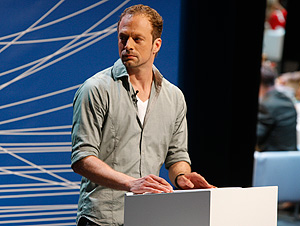 Gunther Geltinger (D) (Bild: Johannes Puch)
Gunther Geltinger (D) (Bild: Johannes Puch)
Video portrait
Reading
Discussion
Strigl: "Blood-and-vomit-literature""
Daniela Strigl emphasised at first, that this was not so much "blood and soil" literature but rather "blood and vomit literature". She suspected right at the beginning that the author wanted to demonstrate radicalism by the amount of body fluids present in the text. This contained "several successful images" but also miscarried metaphors that too clearly showed the direction. Moreover, there are inconsistencies in the depiction of characters - "on a small scale showing the failure of the large project" said Strigl.
Winkels commended faltering speech
Hubert Winkels praised the author's speech, which suited the "faltering" of the text.
However, to mention this as a strength of the disaster is almost comical. He suspected that the text was a caricature of a declining village world. This could have worked for him as "trash text " but that was probably not the author's intention.
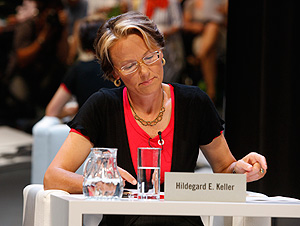 Hildegard E. Keller (Bild: Johannes Puch)
Hildegard E. Keller (Bild: Johannes Puch)
Keller: "not yet digested"
A dramatic childhood can be found in "the reconstruction of a childhood perspective" said Hildegard E. Keller about the text, which is in an "intermediate state" between the "not yet digested" and the vomit: that would however have had needed to be more strongly developed for the text to work.
Feßmann: "Well done"
Meike Feßmann contradicted Daniela Strigl: This is a close, fatal mother-son relationship, whose ambivalence is particularly important: although the text is sometimes overconstructed, because it is the beginning of a novel, but the way the present and past are juxtaposed is "well done".
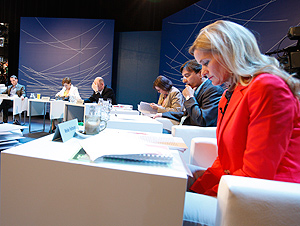 Jury (Bild: Johannes Puch)
Jury (Bild: Johannes Puch)
Jandl: "Text wants to be literature"
Paul Jandl says he found "very strong scenes" in the text, but the problem was that the text wants to be literature and must therefore from the start "produce pages of literature" in order to convey one's own feeling". The existential concern is introduced here first in literary form, a "peculiar" approach.
Sulzer defends his author
"Why in the far north should it not also at times be as it is in Austria?", asked Alain Claude Sulzer, defending Geltinger's text against the objections of his colleagues. Everything has been approached by the colleagues on the vegetative and the geographical level, but not on the artifical aspect of the text. The stereotypical portrayals of the landscape is reflected in the figures. He firmly rejected the suggestion this this was intended to be "trash".
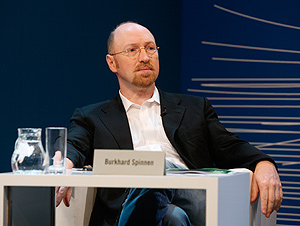 Burkhard Spinnen (Bild: Johannes Puch)
Burkhard Spinnen (Bild: Johannes Puch)
Spinnen: "Texts carry a level of risk"
Burkhard Spinnen said that the text had to question its subject. He gave the text credit for taking a degree of risk and containing good ideas. "Here the bar is pretty high", the text chose "difficult enemies" - "respect for that" said Spinnen.
Barbara Johanna Frank
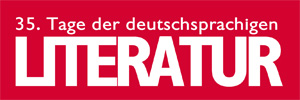 TDDL 2011
TDDL 2011